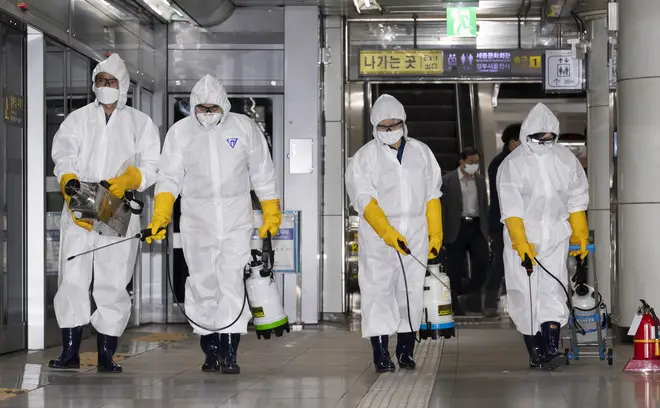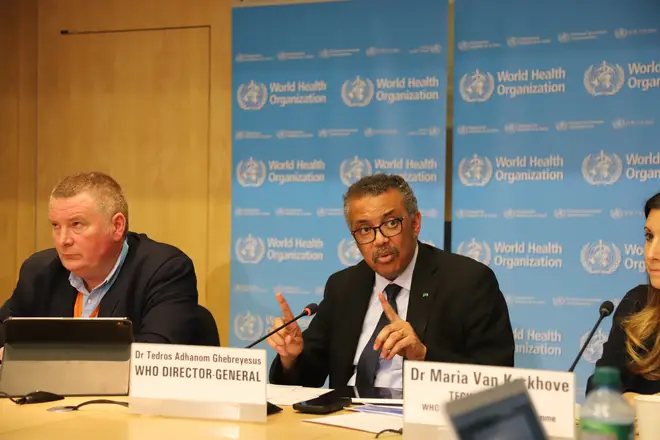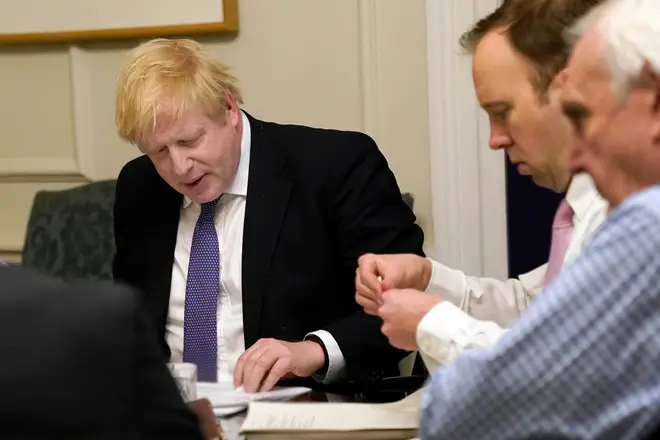
Ian Payne 4am - 7am
29 February 2020, 11:51

The World Health Organisation said people need "a reality check" towards coronavirus and that a worldwide approach is needed.
The risk has been raised from "high" to "very high", bringing the world in line with China, which was already at that level.
This means the risk posed by coronavirus is at the highest possible level it can be, the WHO confirmed.
At this level, an "immediate response" within hours is required as soon a a case is suspected.
It comes after WHO director-general Dr Tedros Ghebreyesus told a press conference in Geneva on Thursday that coronavirus has the potential to become a global pandemic but this stage has not yet been reached.
He said: "We are on the highest level of alert and highest level in terms of spread and of impact. But that is not in order to alarm or scare people.
"People need to take a reality check now and really understand an all-of-government, an all-of-society approach is needed."

The news comes after the first coronavirus patient to catch the illness within the UK was confirmed, on the same day a man who had been on a quarantined cruise ship became the first Briton to die from the virus.
Health leaders confirmed on Friday that a 20th patient had tested positive for the virus, and that it had been passed on within the UK.
Confirming the latest case in England on Friday evening, Prof Whitty said: "One further patient in England has tested positive for Covid-19.
"The virus was passed on in the UK.
"It is not yet clear whether they contracted it directly or indirectly from an individual who had recently returned from abroad.
"This is being investigated and contact tracing has begun.
"The patient has been transferred to a specialist NHS infection centre at Guy's and St Thomas'."
Meanwhile, a British man, reported to be in his 70s and said to have lived abroad, was confirmed as the first UK citizen to die from coronavirus.
The man, who was on board the Diamond Princess cruise ship which has been quarantined off Japan's coast amid the outbreak, was the sixth person from the vessel to have died.
The developments came as the Government prepares to bring in new emergency powers to help stop the spread of Covid-19.
The powers will give schools, councils and other parts of the public sector powers to suspend laws - including health and safety measures - to cope with a pandemic.
Teachers and nursery workers will be allowed to have larger classes to cope with staff absences under the laws, which are due to be introduced next week.

Prime Minister Boris Johnson said that the coronavirus was "now the Government's top priority" as critics accused him of failing to take a lead on the UK response.
He told reporters on Friday that he had met with the Health Secretary and chief medical officer to discuss the preparations.
He said: "On the issue of coronavirus, which obviously is a great concern to people, I just want to reassure everybody and say that the NHS is making every possible preparation.
"As you can imagine, the issue of coronavirus is something that is now the Government's top priority."
Health Minister Helen Whately said it was "likely" more people in the UK would contract coronavirus and that plans were in place should it become a pandemic.
The Conservative MP told BBC Newsnight: "I can't reiterate enough that we are well prepared but we do have to recognise that it is likely we will see more cases in the UK.
"We have plans in place and have carried out exercises so in the event of something like a 'flu pandemic, we are ready."
Asked whether that meant mass gatherings could be banned and schools closed, such as in parts of Italy, she said such measures were "being considered".
"Clearly, how to deal with those sorts of things absolutely has been considered and is being considered. That is rightly all part of the planning," she added.
Wales's chief medical officer Dr Frank Atherton said the first diagnosed patient in Wales had recently travelled back from Italy, the worst-affected country in Europe.
In Tenerife, hundreds of guests have been confined to the H10 Costa Adeje Palace after at least four tourists, including an Italian doctor, were diagnosed with coronavirus.
However, six Britons were among those told they could leave on Friday by Spanish authorities because they arrived at the hotel on Monday - after those who tested positive had been taken to hospital.
Northern Ireland reported its first case on Thursday, as someone who recently returned from northern Italy was diagnosed with the virus.
Irish health authorities said on Friday that people who had sat within two rows of the person on the flight from northern Italy to Dublin have been contacted.
Italy has become the worst-affected country in Europe, with at least 650 cases and 15 deaths.
On Friday, easyJet said it will be cancelling flights as a result of the continued spread of coronavirus, in a move which will particularly affect "those into and out of Italy".
So far, China has reported nearly 80,000 cases and almost 3,000 deaths, while the virus has reached nearly 60 countries with more than 80 deaths.